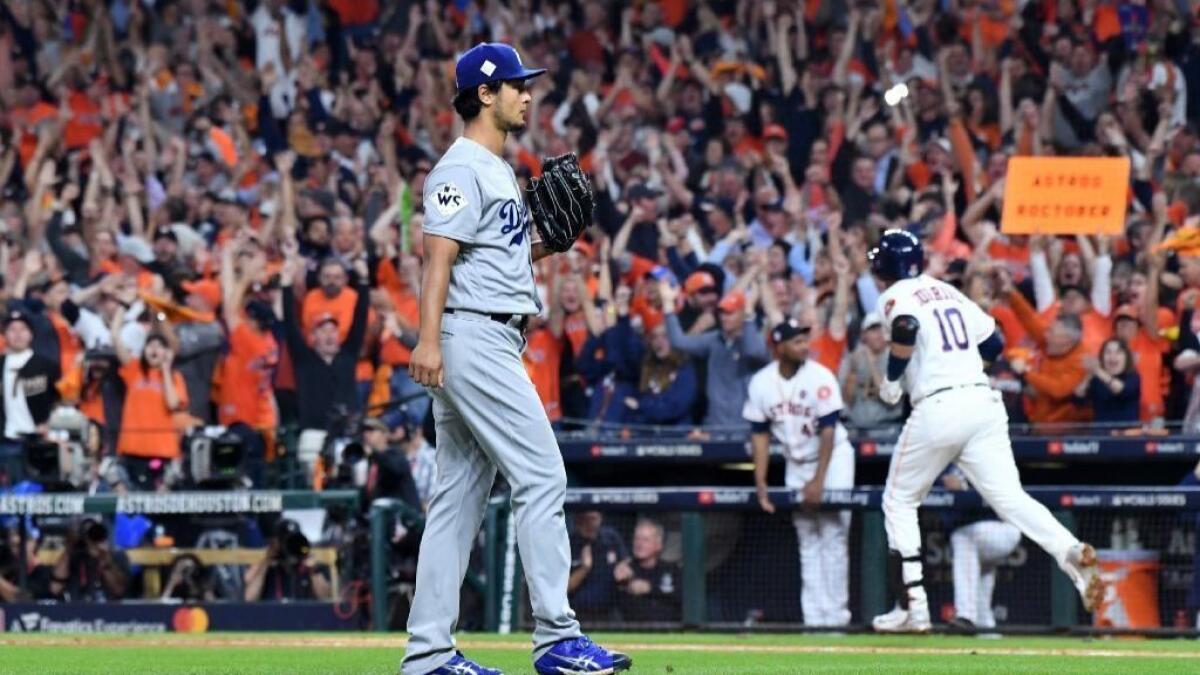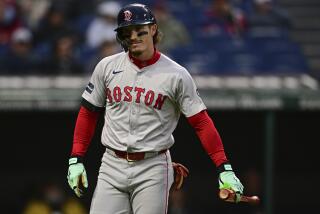Astros blow chance to let Yuli Gurriel make amends to Southland Asian American community
- Share via
Reporting from Houston — Shortly after Zack Greinke reported to his first spring training with the Dodgers in 2013, the team said the right-hander would address his well-documented problems with anxiety once and once only. So one day in February, he shared his story with a group of reporters. The subject was never raised again in Greinke’s three seasons with the Dodgers.
Incredibly, the Houston Astros are asking for similar respect to be paid to Yuli Gurriel — not over a medical condition like Greinke’s, not over something out of his control, but over a racist gesture he made.
“He’s already talked about it,” said Gene Dias, the team’s vice president of media relations. “No more.”
Gurriel is the first baseman from Cuba who hit a home run against Yu Darvish of the Dodgers in Game 3 of the World Series last year, only to be caught by a television camera celebrating the blast by making a slant-eye gesture and mouthing “chinito,” a Spanish word that translates into something along the lines of “little Chinese boy.” Darvish, who now pitches for the Chicago Cubs, is from Japan.
As part of his punishment, Gurriel was forced to undergo an eight-hour sensitivity-training class in the offseason.
When Gurriel was approached in the Astros clubhouse Monday, he was initially reluctant to revisit the episode, which branded him as a racist.
But he nodded when told he hadn’t addressed the fans of Los Angeles. With the Angels in town for the start of a three-game series, he had a platform to speak to the millions of Asian Americans in Southern California he offended.
“You learn from your mistakes,” Gurriel said in Spanish.
Before he could say anything else, the interview was broken up by Dias, who argued that Gurriel had spoken about the incident four times in spring training.
The problem was that when Gurriel was interviewed in the spring, he never really explained what he learned, other than to not make flagrantly racist gestures in the United States.
He said he was disturbed by how the public had the wrong impression of him, but otherwise spoke in platitudes. In one particular conversation with Bleacher Report, he mentioned how Japanese people in Japan weren’t bothered by what he did. He was right about that, but at no point was he quoted saying anything about understanding why Asian Americans were as offended as they were.
The theoretical capacity for him to learn from his mistake was why there were calls for leniency. I made one of them in a column in this newspaper, asking readers to temper their reactions by pointing out how racially charged language and gestures aren’t made with the same level of malice in Latin America as they are in the U.S. My background gave me some familiarity with both sides of the subject; my father is from El Salvador and my mother from Japan.
Gurriel had been in this country for a little more than a year. He offered an immediate heartfelt apology, confirming suspicions that he was more ignorant than he was mean-spirited. He wasn’t using certain language or gestures as a means of reinforcing a system that oppresses certain groups of people.

“The guess here is that if [Gurriel] is told to stop acting like an idiot, he will,” I wrote.
Darvish had similar ideas, only he was considerably more elegant in his phrasing.
“As citizens of the world, if we can learn from this and take a step forward, I think this could be a good thing,” Darvish said in Japanese.
Davish’s words were weighed by the commissioner’s office when the punishment for Gurriel was decided. Instead of immediately suspending Gurriel and potentially altering the course of the World Series, the commissioner’s office instead slapped him with a five-game ban at the start of this season and mandated him to undergo sensitivity training.
But what has the sport gained if Gurriel doesn’t share what he learned? Wasn’t that the entire point of this, that Gurriel would pick up something and pass it along?
Gurriel understood this, which is why he was ultimately open to sharing his thoughts on the matter.
The Astros didn’t, prioritizing the comfort of their cleanup hitter over discussions that could have benefits beyond the turnstiles at Minute Maid Park.
“At some point, [Gurriel] needs to move on,” Dias wrote to me in a follow-up email.
That’s not for the Astros to decide.
What unfolded in Houston in November wasn’t a baseball problem, it was a society problem. This wasn’t only about one player, this was also about the fans who were hurt by his actions and haven’t moved on.
A few thoughtful remarks could have started the process. Gurriel was willing. The Astros weren’t and that’s unfortunate.
Follow Dylan Hernandez on Twitter @dylanohernandez
More to Read
Go beyond the scoreboard
Get the latest on L.A.'s teams in the daily Sports Report newsletter.
You may occasionally receive promotional content from the Los Angeles Times.











